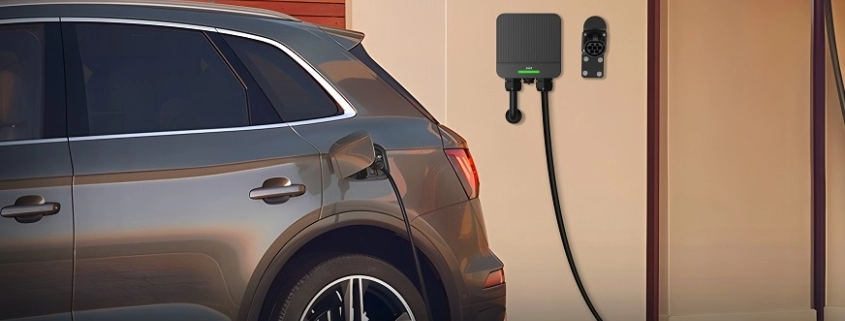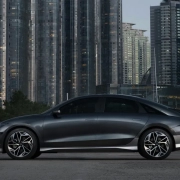Elevate Your Home with a Residential EV Charger
Are you ready to embrace the future of transportation and add an electric vehicle charger to your home? In this step-by-step guide, we’ll go through each stage of installing a Level 2 residential EV charger while answering key questions along the way.
What Is a Level 2 Residential EV Charger?
For efficient home charging of an electric car, Level 2 residential EV chargers offer superior efficiency over standard Level 1 chargers found on most electric vehicles. As their charging process is faster, a Level 2 residential EV charger allows more time spent enjoying home charging convenience versus waiting.
Level 2 chargers use higher voltage, offering your electric vehicle greater power for faster charging times compared to Level 1 models. Residential EV chargers offer convenient solutions that meet everyday charging needs at home.
Is Residential EV Charging Cheaper?
Residential EV charging may appear more cost-effective in most instances than using public EV stations. Thus, becoming one of the primary concerns among owners. Luckily, when charging at home, it is likely less costly.
Investment in residential EV charging may save money and provide convenience. Let’s examine whether residential charging stations compare favorably to public ones!
1. Residential EV Charging Cost
Charging at home tends to be less costly than at public stations due to the different pricing structures and electricity rates in each location. Charging your EV at home allows you to take advantage of off-peak electricity rates, which could save you money throughout its use.
Residential EV charging allows the convenience of overnight charging to ensure your car will be ready when you start your day. Plus, with its flexibility to choose the time and day when charging sessions should take place, there are additional savings in cost savings.
2. Public EV Charging Cost
While public charging stations provide convenience and accessibility, their cost per kilowatt-hour (kWh) may be higher than residential. Furthermore, each charging provider often imposes its pricing model, with some charging providers offering faster charging at an additional expense.
3. Factors to Consider
- Electricity Rates:
Compare residential electricity rates with public charging stations’ costs in your region to understand which option will provide greater cost-efficiency in terms of price per kWh consumption. This information will enable you to select an optimal option suited for you in terms of both time and money savings.
- Charging Frequency:
Determine how frequently your electric vehicle requires charging; residential charging may be more economical for day-to-day needs, while public stations may offer better coverage on road trips or during occasional use.
- Charging Speed:
Take into consideration what charging speed your electric vehicle requires for optimal use. Fast-charging stations might be ideal for quick top-ups during travel; residential chargers could offer faster but cheaper charging for daily recharging needs.
- Consider Convenience and Accessibility:
Carefully consider both residential charging at home and public stations for accessibility. Remember your lifestyle and daily schedule before making the best possible choice for yourself.
Home charging may often be less costly than public EV charging due to lower electricity rates and more flexible charging hours. However, your choice depends on several factors including location, charging needs, and lifestyle considerations. Finding an optimal balance can help maximize costs while simultaneously taking full advantage of the ownership benefits of an electric vehicle.
| Factors | Residential EV Charging | Public EV Charging |
| Cost per Kilowatt-Hour (kWh) | Typically lower, based on local residential rates | Can be higher, may include fast-charging premium |
| Charging Location | At home, providing convenience and accessibility | On the go, accessible at public charging stations |
| Charging Speed | Moderate, suitable for overnight charging | Varied, with fast-charging options for quicker top-ups |
| Charging Frequency | Suitable for daily charging needs | More suitable for occasional use or during travel |
| Electricity Rate Flexibility | Can take advantage of off-peak hours for savings | Rates set by charging providers, less flexibility |
| Convenience | Convenient but may require planning for longer trips | Immediate accessibility but may involve waiting times |
| Overall Cost | Generally cost-effective for regular use | Costs can accumulate, especially with frequent usage |
Can I Install an Electric Vehicle Charger at Home?
Yes. Installing a Level 2 residential EV charger at home is both feasible and practical, providing immense advantages. To start, think about factors like its power capacity, location for installation, and compatibility with your electric vehicle when making this decision.
When selecting an ideal home EV charger, take charging speed, durability, and user-friendliness into consideration. There are a range of charger options on the market, including smart ones that enable remote monitoring/control charging. Look for something that complements both your electric vehicle’s needs as well as seamlessly fits into daily life.
How can I install a Level 2 charger at home? many chargers are designed for easy self-installation. However, certified electricians offer expert installations when desired. From selecting an optimal location to linking it with your electrical system and beyond, installation should be a straightforward process that increases home functionality and enhances its value.
How to Install a Residential EV Charger at Home
1. Select an Appropriate Charger:
To select an EV charger that best meets the charging specifications for your electric vehicle, consider factors such as charging speed, compatibility, and additional features like smart connectivity.
2. Choose Your Installation Location:
Follow the advice and find an ideal location for your electric car charger, near a parking lot that is easily accessible to electric vehicles. Make sure it complies with local codes for a safe, efficient installation.
3. Assess Electrical Capacity:
Measure whether your home can accommodate the electric vehicle charger you have selected and consult a certified electrician about upgrades or modifications needed, along with finding the ideal power supply source.
4. Secure Professional Installation:
Though certain residential EV chargers can be easily set up without professional assistance, for optimal results it’s wiser to hire an accredited electrician for installation purposes. Their skilled setup will guarantee the charger connects safely with the electrical grid while complying with safety standards and meeting them accordingly.
5. Consider Smart Charging Features:
For added features such as remote monitoring, scheduled charging, or integration with smart home systems, consider investing in a charger equipped with smart capabilities. Such features add ease and flexibility to the charging experience.
6. Verify Local Regulations and Permits for Installation:
Before undertaking the installation of an EV charger in your residential setting, always confirm local laws and obtain all required permits to ensure an easy, legal installation process.
7. Installation and Testing:
After your electric vehicle charger has been successfully installed, an electrician will conduct thorough testing to make sure everything functions as it should and address any potential issues with its use. They’ll also offer guidance regarding its usage as well as provide any support needed.
Which Home EV Charger Should I Choose?
With many choices on the market and finding your ideal charger taking careful consideration into account is key to finding one suitable to you and your electric vehicle’s specifications and capabilities, finding your ideal home electric charger may require careful research and evaluation of key factors. While buying the fastest home charger may tempt you, faster is not necessarily better when choosing an appropriate charge rate charger that complements its capabilities and will give the optimal experience when charging up an EV car.
Factors to Keep in Mind when Selecting a Residential EV Charger:
- Charging Speed:
Charging speeds for electric vehicle chargers should match up with their capabilities, more rapid charging may appear appealing, but matching up their charging rate to that of your EV vehicle’s specifications may be essential to successful charging experiences.
- Compatibility:
Make sure the residential EV charger you purchase is compatible with your electric vehicle model and make. Different car makes and models may have various charging port specifications and types. Thus verify if your charger meets these needs before making your purchase decision to avoid compatibility issues.
- Power Capacity:
Carefully consider the capacity of any charger you choose for your electrical system, since some require higher voltage or dedicated circuit. Speak with an experienced electrician in your area about whether your home’s infrastructure can support their choice.
- Smart Features:
Smart chargers offer additional convenience and control, including features like remote monitoring, scheduled charging, and compatibility with smart home systems. Taking advantage of such smart features can allow you to optimize and streamline the charging process efficiently.
- Ease of Use:
A user-friendly interface and installation process can make all the difference when searching for residential EV chargers. Identify the one that best meets your technical comfort levels, be it simple plug-and-charge options or a more sophisticated setup.
How to Choose the Best Residential EV Charger
Step 1: Assess Your Electric Car’s Needs
Learn what kind of charging capabilities and speeds your electric car provides so that you can select an EV charger to meet it. Keeping this information handy will enable you to identify one that meets your vehicle’s specifications perfectly.
Step 2: Check Compatibility
Confirm that the residential EV charger is compatible with your electric vehicle. Review the charging port type, voltage requirements, and any specific recommendations the car manufacturer provides.
Step 3: Evaluate Charging Speed
Evaluate your charging needs and daily schedule before selecting the most effective charging speed for you. A faster charger could prove valuable when faced with limited charging window time. Otherwise, a slower charger might suffice if your car supports lower charging rates while giving enough time for overnight recharging.
Step 4: Evaluate Smart Features
Consider what features of smart chargers you might find beneficial such as remote monitoring, scheduled charges, or integration with smart home systems, they offer added ease and control to make charging simpler than ever.
Step 5: Evaluate Installation Requirements
The charger you choose must match both your installation preferences and home electrical system specifications, some chargers can be easily self-installed while others require professional help for optimal installation results. Before making your decision, ensure it will meet both these criteria.
Conclusion
Elevating your home with an EV charger is both a practical and rewarding decision. Not only will you appreciate having easy access to charging your electric car from home, but the installation process should go smoothly as you embrace a sustainable, eco-friendly lifestyle from within your own home. Invest in your future of transportation today, then get charging up.





Leave a Reply
Want to join the discussion?Feel free to contribute!